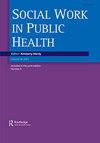'We Were an Afterthought': Corona Virus Disease 2019 (COVID-19) Pandemic in Culturally and Linguistically Diverse (CALD) Communities in New South Wales, Australia.
IF 1.7
4区 医学
Q3 PUBLIC, ENVIRONMENTAL & OCCUPATIONAL HEALTH
引用次数: 0
Abstract
This paper investigates the impact on Culturally and Linguistically Diverse (CALD) communities in Australia of government and community responses to the coronavirus pandemic of 2019 in the domains of education, employment, housing, social connectedness, and public health communication. Most of the examples are drawn from the state of New South Wales. In Australia, CALD refers to people from countries not classified as main English speaking. Most CALD communities reported in this article are from refugee backgrounds, are recently arrived migrants or do not use English in most of their communication. Inadequate, and in some instances, inappropriate or absent support, adversely impacts CALD communities. We used a multidisciplinary bricolage approach that draws on media, government, and community support publications and concluded that CALD communities experienced heightened pressures due to lower resource availability and poor communication. This led to disruption of support services, exposing gaps and vulnerability. The results reported here challenge Australian government, schools, community agencies, researchers to include proactively CALD community perspectives when planning and responding to such crises in future. Improving communication, pandemic response planning, addressing needs and ensuring participation are key considerations.我们是事后才想到的":科罗娜病毒病 2019 (COVID-19) 在澳大利亚新南威尔士州文化和语言多样化 (CALD) 社区的流行。
本文研究了澳大利亚政府和社区在教育、就业、住房、社会联系和公共卫生交流等领域应对 2019 年冠状病毒大流行对文化和语言多样化(CALD)社区的影响。大部分例子来自新南威尔士州。在澳大利亚,CALD 指的是来自非主要英语国家的人。本文所报道的大多数 CALD 群体都有难民背景,是新近抵达的移民,或者在大部分交流中不使用英语。在某些情况下,不充分、不适当或不存在的支持对 CALD 群体产生了不利影响。我们采用了一种多学科的混合方法,借鉴了媒体、政府和社区支持出版物的内容,得出结论认为,由于可用资源较少和沟通不畅,CALD 社区承受着更大的压力。这导致支持服务中断,暴露出缺口和脆弱性。本文报告的结果对澳大利亚政府、学校、社区机构和研究人员提出了挑战,要求他们今后在规划和应对此类危机时,积极主动地纳入 CALD 社区的观点。加强沟通、制定大流行病应对计划、满足需求和确保参与是关键的考虑因素。
本文章由计算机程序翻译,如有差异,请以英文原文为准。
求助全文
约1分钟内获得全文
求助全文
来源期刊

Social Work in Public Health
Multiple-
CiteScore
4.20
自引率
4.00%
发文量
55
期刊介绍:
Social Work in Public Health (recently re-titled from the Journal of Health & Social Policy to better reflect its focus) provides a much-needed forum for social workers and those in health and health-related professions. This crucial journal focuses on all aspects of policy and social and health care considerations in policy-related matters, including its development, formulation, implementation, evaluation, review, and revision. By blending conceptual and practical considerations, Social Work in Public Health enables authors from many disciplines to examine health and social policy issues, concerns, and questions.
 求助内容:
求助内容: 应助结果提醒方式:
应助结果提醒方式:


